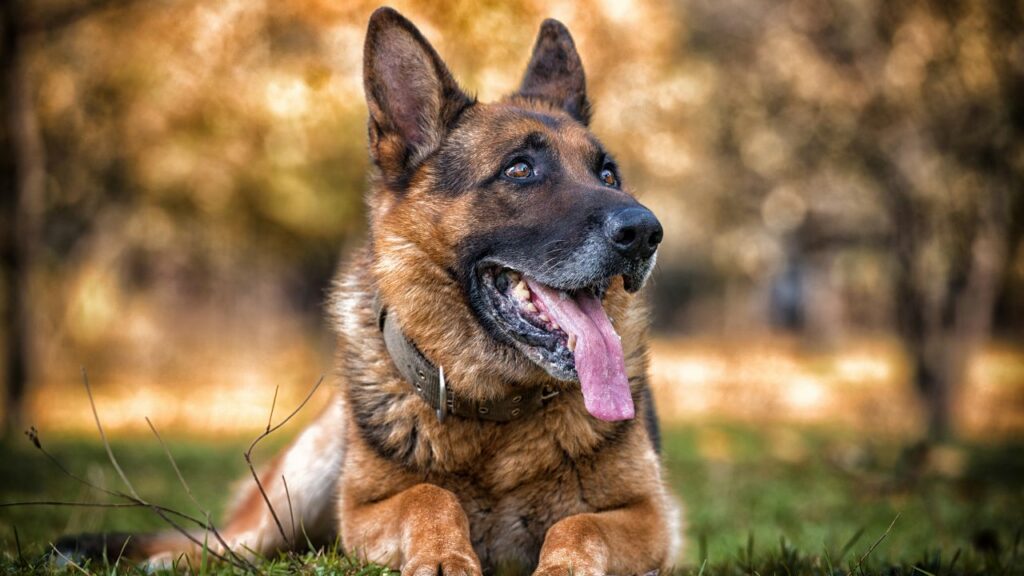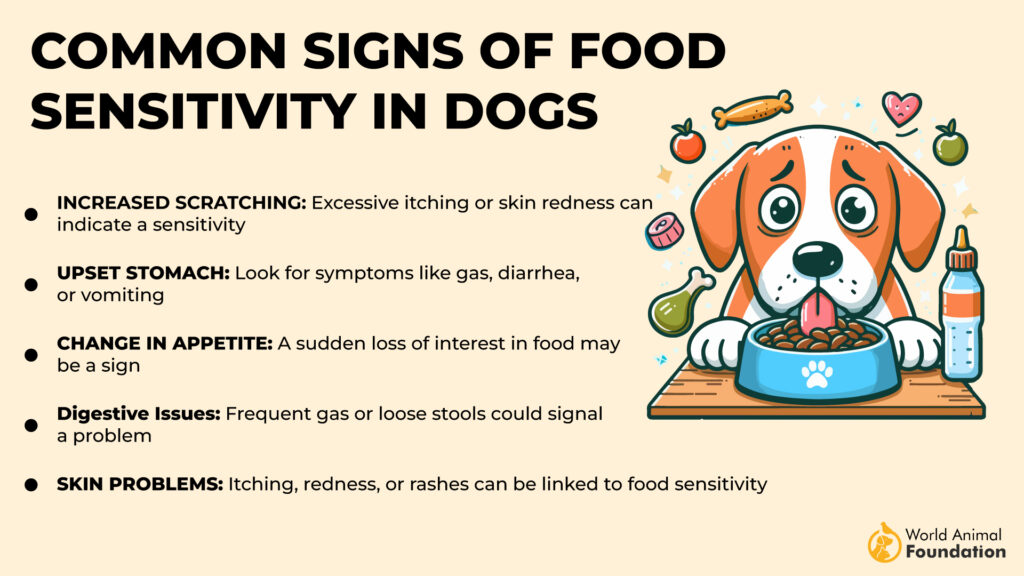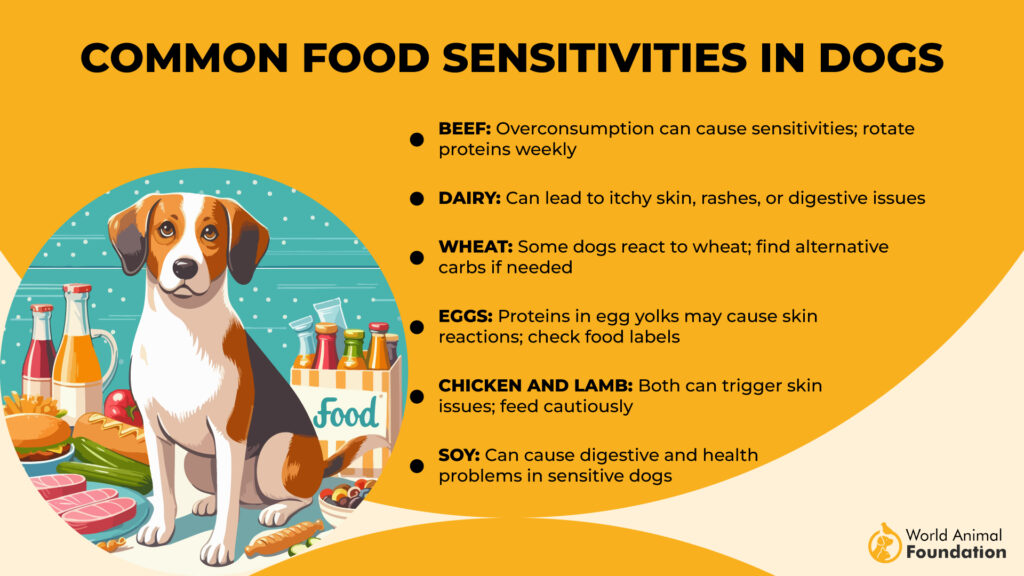Man’s best friend deserves the best, but some breeds are prone to tummy troubles. Food sensitivities in dogs can manifest as itchy skin, ear infections, and digestive upset. While any dog can develop these issues, certain breeds are genetically predisposed. Understanding which breeds are more susceptible is crucial for proactive care. Discover the seven dog breeds most commonly affected by food sensitivities and learn how to navigate dietary choices for a happier, healthier pup.
Just like people, some dogs can be sensitive to certain foods, and it’s important to recognize when your furry friend might be struggling with something in their diet. Whether it’s recurring vomiting, diarrhea, soft stools, or gas, food sensitivities can make your dog uncomfortable and signal a potential problem. If your dog is showing these symptoms, it’s crucial to consult with your vet to determine the cause and find the best solution.
According to the AKC, many dogs are sensitive or even allergic to common proteins like chicken or beef, while others may be lacking essential nutrients such as fiber, vitamins, or minerals. Sometimes, their diet might even have too much fat, leading to digestive issues.
While any dog can develop food sensitivities, certain breeds are more prone to these issues due to their genetics. Managing these sensitivities often means switching to hypoallergenic or specialized diets to keep them healthy and comfortable. Understanding which breeds are most likely to develop food sensitivities can help owners make informed decisions about their dog’s nutrition and overall well-being.
Let’s take a look at 7 dog breeds that are most prone to food sensitivities.
Dog Breeds With the Most Food Sensitivities
1. Dalmatian
Dalmatians, known for their iconic role as “firehouse dogs,” are intelligent, trainable, and make excellent watchdogs. However, they are more prone to food sensitivities related to urinary health rather than typical food allergies. Dalmatians have a genetic predisposition to develop urinary urate stones due to their limited ability to convert uric acid into allantoin.
Uric acid is produced from purine metabolism, so avoiding purine-rich foods is crucial for managing this condition. While not a traditional food allergy, this sensitivity requires careful attention to their diet. Dalmatians should be fed a diet low in purines to help prevent stone formation, with canned food often being a better option than kibble due to its higher moisture content.
Encouraging plenty of water intake and regular walks to promote frequent urination can further reduce the risk of urinary stones, keeping your Dalmatian healthy and happy.
2. Cocker Spaniel
Cocker Spaniels, with their playful and affectionate nature, make wonderful companions for families and active individuals alike. However, they are prone to food sensitivities that can lead to health issues, particularly affecting their skin and ears.
Their long ears, while adorable, create a warm and moist environment that can easily become a breeding ground for yeast and bacteria, especially when food sensitivities cause excessive scratching or head shaking. This can result in frequent ear infections, a common problem in Cockers. According to WPVet, food allergies in Cocker Spaniels are often inherited and can manifest at any age, but they’re most frequently seen in young adult dogs.
Symptoms may include itchy skin, recurring ear infections, and digestive issues like chronic vomiting or diarrhea. Managing these sensitivities typically involves carefully selecting their diet, possibly using grain-free or single-protein options to avoid common allergens. Keeping their ears clean and dry is also essential in preventing secondary infections related to food allergies.
3. German Shepherd
German Shepherds, known for their intelligence, loyalty, and versatility, are cherished companions and working dogs worldwide. However, like many breeds, they can be prone to food sensitivities that require special attention from their owners. One of the most common signs of food allergies in German Shepherds is skin-related issues such as itching, rashes, or hot spots.
In addition, gastrointestinal problems like vomiting, diarrhea, or frequent bowel movements can signal that something in their diet isn’t agreeing with them. Chronic ear infections or excessive earwax can also be linked to food sensitivities, often caused by common proteins such as beef or chicken.
Managing these sensitivities involves identifying the triggers and providing a carefully tailored diet that avoids allergens. Though challenging, food sensitivities in German Shepherds are manageable with the right approach, ensuring they remain happy and healthy. By closely observing your pet’s behavior and addressing any signs of distress early, you can maintain their well-being and strengthen the bond you share.
4. Labrador Retriever
Labrador Retrievers, with their sweet faces and lovable nature, consistently rank as one of America’s most popular dog breeds. Known for their friendly and outgoing personalities, Labs are wonderful companions, but they are also more prone to food allergies and sensitivities compared to many other breeds.
This genetic predisposition means their bodies often react more intensely to certain ingredients found in commercial dog foods, which can contain a mix of preservatives, vitamins, proteins, and carbohydrates. Common symptoms of food allergies in Labs include itchy skin, frequent ear infections, and gastrointestinal issues like vomiting or diarrhea. Identifying the specific ingredients causing these reactions is essential for their well-being.
Many Labrador owners find that switching to a limited-ingredient or hypoallergenic diet helps manage these sensitivities, ensuring their dogs stay healthy and happy. With proper care and attention to their diet, food sensitivities in Labs can be effectively managed, allowing them to thrive.
5. Shar-Pei
The Chinese Shar-Pei, known for its distinctive wrinkles and loyal personality, requires special care when it comes to diet and nutrition. While they need a balanced diet like all dogs, including proteins, fats, carbohydrates, vitamins, and minerals, Shar-Peis are particularly prone to food sensitivities and allergies.
These food sensitivites can manifest as itching, ear infections, or digestive issues such as vomiting or diarrhea. If a food allergy is suspected, consulting with a vet is crucial, and they may recommend an elimination diet to pinpoint the specific allergen.
Incorporating probiotics and easily digestible proteins into their diet can help support gut health and reduce digestive discomfort. Feeding your Shar-Pei a high-quality, limited-ingredient formula can go a long way in preventing gastrointestinal upset and keeping them healthy and happy.
6. Boxer
Boxers, known for their energetic and playful nature, are also highly sensitive to food allergies, which can significantly impact their health. These sensitivities often show up as gastrointestinal issues like vomiting and diarrhea or skin conditions such as hives and intense itching. Common allergens for Boxers include grains like corn and wheat, as well as certain proteins.
Interestingly, a Boxer can develop an allergy to an ingredient they’ve eaten without issue for years, making it important to stay vigilant about their diet. When food sensitivites are suspected, elimination testing is a common approach to identify the problem. This involves feeding your Boxer a strictly hypoallergenic diet, with no room for error, as even the smallest amount of a previously consumed allergen can corrupt the test.
Your vet may recommend hypoallergenic commercial dog food or a simple homemade diet, such as plain, cooked chicken breast and white rice. While the process of finding the exact allergen can take months, it is essential for restoring your Boxer’s health and ensuring their long-term well-being.
7. French Bulldog
French Bulldogs are known for their laid-back and adaptable nature, making them great family pets, especially with children. However, despite their sturdy appearance, Frenchies are prone to several health issues, including food intolerances that often lead to skin problems like hot spots and dermatitis.
Their genetic makeup makes them more susceptible to food allergies, with common triggers being beef, chicken, and wheat. Switching to a diet that eliminates these allergens, such as one free of dairy and grains, can help reduce the risk of inflammatory reactions.
To prevent food allergies in your Frenchie, it’s best to opt for dog foods that use wholesome ingredients and single-source proteins. These foods not only provide essential vitamins and minerals but also support your dog’s digestive and immune systems without any unnecessary fillers. By making mindful choices about their diet, you can help keep your French Bulldog healthy and comfortable.
Conclusion
Food sensitivities and allergies in dogs are often linked to a dog’s breed, as certain breeds are more genetically predisposed to develop allergies. Common food allergies can cause various symptoms, from skin allergies like irritated skin and hot spots to gastrointestinal issues. When a dog eats the same food that triggers an allergic reaction, it can lead to long-term health problems.
Dog parents must stay vigilant and monitor for any signs of adverse reactions, such as skin problems or digestive distress, which can indicate a food sensitivity or allergic reaction. Maintaining a nutritious diet, free from common allergens like beef, chicken, or grains, is essential for managing these issues.
Dog owners can help strengthen their pet’s immune system and minimize allergic reactions by offering hypoallergenic foods and being mindful of potential environmental factors. A pet’s diet plays a significant role in reducing food sensitivities and preventing skin allergies, so it’s crucial to tailor the dog’s diet to avoid ingredients that cause adverse reactions.
For breeds that are more prone to food allergies, consulting a vet to identify the best options for a balanced and allergy-free diet is key to keeping your dog healthy and happy.
While all dogs can develop food sensitivities, certain breeds like German Shepherds, Bulldogs, and Golden Retrievers appear predisposed. Identifying and managing these sensitivities is crucial for their well-being. Elimination diets guided by veterinary professionals are the most effective approach to pinpoint trigger ingredients. Opting for limited-ingredient diets or hydrolyzed protein formulas can significantly reduce allergic reactions and improve a sensitive dog’s quality of life. Careful observation and proactive management are key to ensuring these breeds thrive despite their predispositions.










